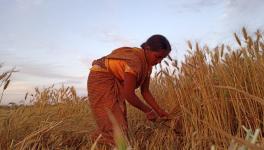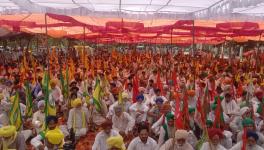Why Punjab Farmers are Protesting Against Bhagwant Mann Government
File Photo.
Punjab’s farmers are battling the central government to make it fulfil the promises made to them, but they have also had to open another front against the Bhagwant Mann-led Aam Aadmi Party state government. They suspended their movement against the three farm laws on the borders of Delhi over a year ago, but are mobilising against the Prime Minister Narendra Modi government to fulfil its promises made at the time. They are expressing anger against the central government for the delay in implementing their key demands.
The farmers’ demands for the central government include justice for victims of the Lakhimpur Kheri incident, especially the dismissal of Union Minister Ajay Mishra, whose car mowed down protesting farmers. They want the government to make minimum support prices or MSP mandatory for all crops as promised and for the cases registered against farmers and youth during the farm agitation to be revoked. Reversing the Electricity Bill, 2022 is another crucial demand.
Similarly, in Punjab, farmer organisations say even Chief Minister Bhagwant Mann’s government has not shown any sincerity in fulfilling farmers’ demands. This has motivated numerous recent protests against the state government. The 31 farmer organisations of the Samyukta Kisan Morcha recently said they would gherao the ministers’ homes to press their demands. Jagmohan Singh Uppal, leader of Bharatiya Kisan Union Ekta (Dakonda), says they held this gherao because “the Bhagwant Mann government is not serious about the farming issues.”
Among their demands from the state government are providing proper treatment facilities to save their cattle from the lumpy skin disease scrouge and adequate arrangements to dispose of the animals dying of the disease. The veterinary treatment system is in bad shape all over the state. The second demand is regarding the rate of sugarcane and arrears payable to farmers. Though the Punjab government has released the pending sums of cooperative sugarcane mills to farmers in two instalments as promised, farmers still await the interest on arrears and the arrears of private mills. Uppal says the Punjab government has also maintained silence on increasing the price of sugarcane.
The demands of sugarcane farmers are among the most significant ones raised by the farmer organisations. Due to these factors, the farmers have started big demonstrations since early August and staged a sit-in on the Delhi-Amritsar National Highway. Manjit Singh Rai, president of the Bharatiya Kisan Union Duaba, says sugarcane mills have to pay arrears of about Rs. 350 crore to farmers. Of these, Rs. 100 crore are from cooperative mills and about Rs. 250 crore are from private mills. The highest amount is of the Phagwara Mill (a private mill), which is Rs. 72 crore, pending for over three years.
On the evening of 4 September, the government announced that the Punjab government would sell a property of the Phagwara Mill to raise the pending dues. The mill management has indicated it cannot afford to make the payment to farmers, which had the government step in. Accordingly, the farmers suspended their protest on the night of 4 September after meeting Punjab Agriculture Minister Kuldeep Dhaliwal, who said Rs. 23.79 crore would be recovered by selling a property of the mill.
When asked what other farmers’ demands are pending with the Punjab government, farmer leader Jagmohan Singh said, “The farmers have not yet received the compensation for crop failures. The previous state government had promised Rs. 5 lakh and jobs to the families of farmers who were martyred in the farmers’ agitation. The AAP government had said it would fulfil this assurance. But during the Charanjit Singh Channi government’s term, this Rs. 5 lakh had almost cleared all hurdles. The promise of jobs is yet to be fulfilled by the Bhagwant Mann government.”
The Telangana government had announced a Rs. 3 lakh payment for the families of those who died in the farmer agitation. However, this amount can only be paid with the Punjab government’s assistance, which is yet to be received. Apart from this, the government has not considered the exact details of the suicides of farmers and farm labourers and financial assistance to the victims’ families. Due to indebtedness or crop failures, cases of farmer or labourer suicides are rising in Punjab. Recently, some such instances came to light from the Mansa district, which has been plagued by this menace in recent years.
Farmer Paramjit Singh, who owns two acres and took on contract three more acres, had his standing crop spoiled by pink bollworm. He waited for government or any other social assistance but, at last, embraced death. Another farmer from the Mansa district, Gurpreet Singh, committed suicide due to financial constraints. According to data compiled by the Captain Amarinder Singh government, as of 31 March 2017, Punjab’s farmers had institutional credit of Rs. 73,777 crore, excluding loans from private sources or money lenders. When the government surveyed the debt of labourers, it found that the head of every labourer family in the state owed Rs. 77,000—even more than farmers owe. The central and state governments never took this concern seriously. According to data compiled by three universities in Punjab, in the 15 years from 2000 to 2015, 16,606 farmers and labourers of the state committed suicide.
In 2015, the government prepared a relief policy for suicide victims, which provides Rs. 2 lakh (later revised to Rs. 3 lakh) worth of immediate financial relief. However, this policy is so complicated that it has become nothing more than a piece of paper. Sukhdev Singh Kokri, general secretary of Punjab’s largest farmer organisation Bharatiya Kisan Union (Ekta-Ugrahan), says, “The Bhagwant Mann government has made promises but too little effort to fulfil them. Farmer and labourer suicides are a big issue.” For instance, the government has assisted the farmers whose crops were spoiled by pink bollworms only in areas where they struggled for it. “Despite a lot of crop damage, it provided no help in the Muktsar district,” he says. That is why, in Muktsar, the farmers have intensified their struggle for government assistance.
Similarly, farmers are demanding the state government takes measures to prevent spurious milk and raise the rate of milk to Rs. 10 per fat. The fattier milk is, the better price it fetches for dairy farmers. Buffalo milk typically fetches significantly higher prices, while government dairies often pay an additional Rs. 1 as bonus. In effect, the dairy farmers want the rates raised from roughly Rs. 7 per fat to Rs. 10 per fat. They have also demanded steps to stop the water of rivers from getting polluted.
The author is a freelance journalist. The views are personal.
Get the latest reports & analysis with people's perspective on Protests, movements & deep analytical videos, discussions of the current affairs in your Telegram app. Subscribe to NewsClick's Telegram channel & get Real-Time updates on stories, as they get published on our website.
























